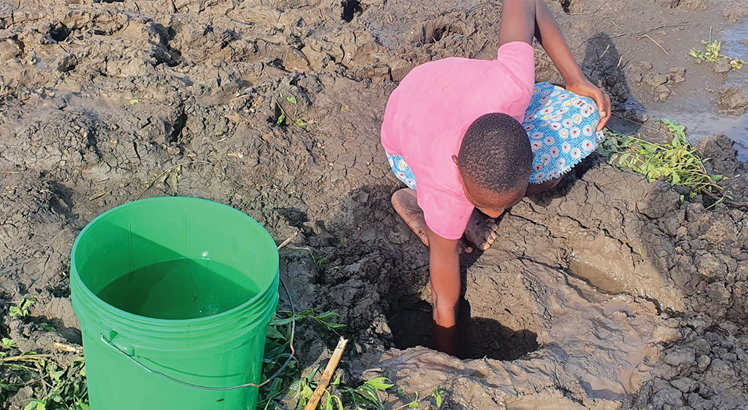At least we’ve water’ is not good enough
Many Malawians mistake boreholes for safe drinking water.
Policymakers, politicians and watchdogs say the same thing—drill, drill, drill—when providing water for the rural majority.
Drillers love it too. They cash in and sometimes receive goats from communities excited to see water splashing under the rig. However, Kadyamba Villagers in Traditional Authority Ngowe, Chikwawa, regret not asking the drillers if the water point in their midst ticked all the boxes, including water quality.
“When the drillers found water, the village ululated. No one dared ask if the location was OK or the water was fit for drinking,” says Elufe Biyasoni.

The villagers now rue applauding a pump that churns out salty water.
“The only borehole in our area is too salty for cooking, bathing and washing,” he says.
Just like that, a borehole drilled to safeguard the community from cholera outbreaks fuelled by floods increases high risk of waterborne infections.
Now the villagers walk almost two kilometres to fetch less salty water from hand-dug wells in Mtayakhasu marsh where floods leave stagnant pools when tragedy strikes.
On arrival in the wetland, they sit down to rest and await the wells to recharge. After 20 minutes, they kneel in mud, bending to the ground, dipping their arms in the narrow, shallow wells to fill their buckets a cupful at a time.
“It’s not easy being a girl or a woman in this village. You seldom see men doing this. Maybe if there was money attached,” explains Biyasoni, walking back home with a heavy bucket balancing on her head.
Women and girls in Kadyamba do the work of pipes to sustain the well-being, sanitation and hygiene of their families.
However, waterborne diseases remain rampant.
“The most common is diarrhoea, mostly among children. This forces us to use our meagre income to buy Waterguard, but many people cannot afford the water treatment chemical or take time to boil the water before drinking it,” narrates Feliya Mpaso.
The wells brim with murky water when flooding occurs in the uplands where latrines are far apart.
Health crisis
The floods demolish latrines and wash away human excreta from the pits and open bushes into the wetland dotted with wells that provide drinking water to communities escaping salty water.
This increases the risk of waterborne and sanitation-related diseases that haunt half of the outpatients in the country’s health centre.
As they return from the wells, women lament a raw deal.
“I feel short-changed that a borehole is located right in my backyard, but I cannot use the water. Instead, I have to endure a tiresome walk just to draw muddy water for home use,” says Mpaso.
Village head Kadyamba says the bitter gushes from the borehole have stained the teeth of many young people.
“The children with yellow teeth brush them daily, but they are permanently stained by the water from the borehole and the dambo.
“Even government officials and their partners know the water is bad. When coming here, they bring bottled water. How can you fight for safe water for our right to safe drinking water?”
And the village is running out of self-confidence that young people offer.
Children seldom smile for fear of exposing their yellow teeth to ridicule.
Muthi Nhlema, from Baseflow, says “the pathetic situation” is far too common in the Shire Valley.
He states: “Unfortunately, it speaks to a problem which many practitioners rarely talk about or deal with adequately—water quality.
“Many times people say ‘at least they have waters, but that’s unacceptable. ‘At least we have water’ is not good enough. We need to ensure that people get fresh water, as fresh as possible.”
For the engineer-turned-campaigner, the water crisis calls for tough decisions, “even if it means piping freshwater from surrounding villages or relocating the entire community”.
Any solution?
Chikwawa district water officer Rester Msuza says Kadyamba water point only produces fresh drinking water when left untouched all day.
“The situation is really pathetic, but efforts are there to provide solar-powered piped water supply system with assistance from Water for People,” he said.
The non-governmental organisation has installed a similar system in Tsamba, T/A Ngabu, which serves over 4 000 people.
“The system has liberated us, especially women and girls, from scrambling for dirty water from unprotected wells. Most boreholes in my area produce salty water,” says group village head Tsamba






One Comment